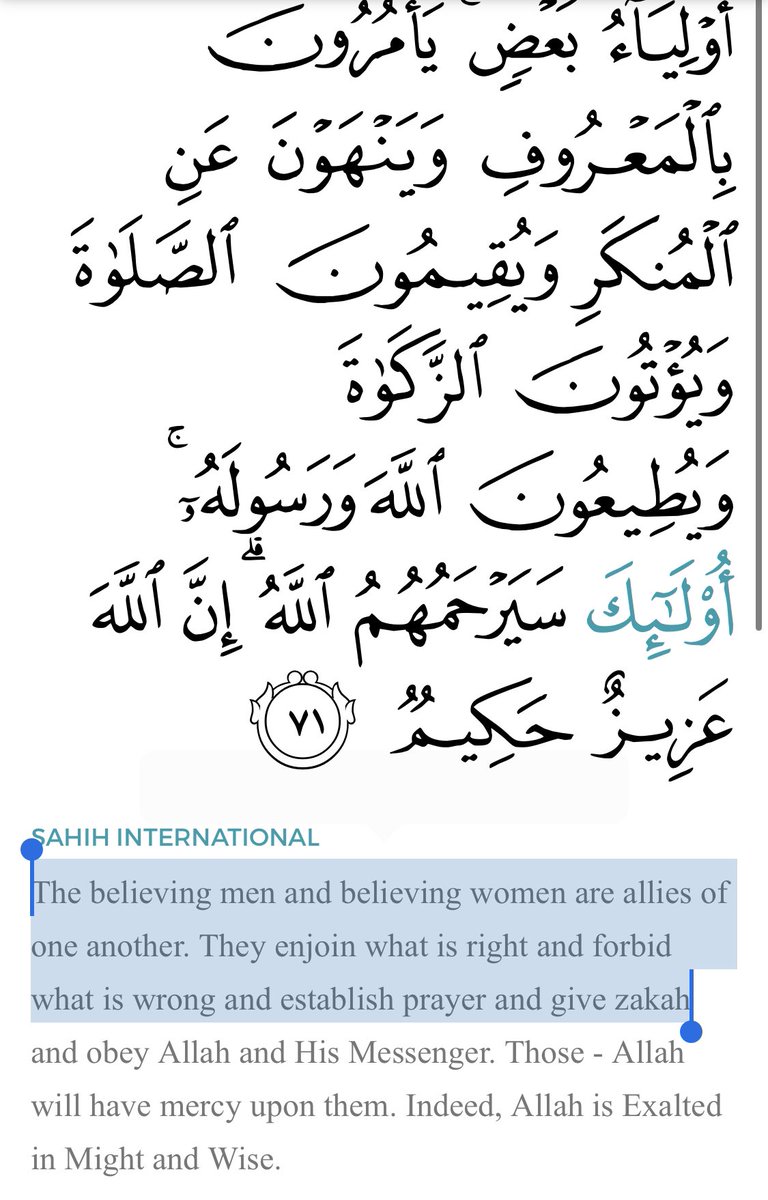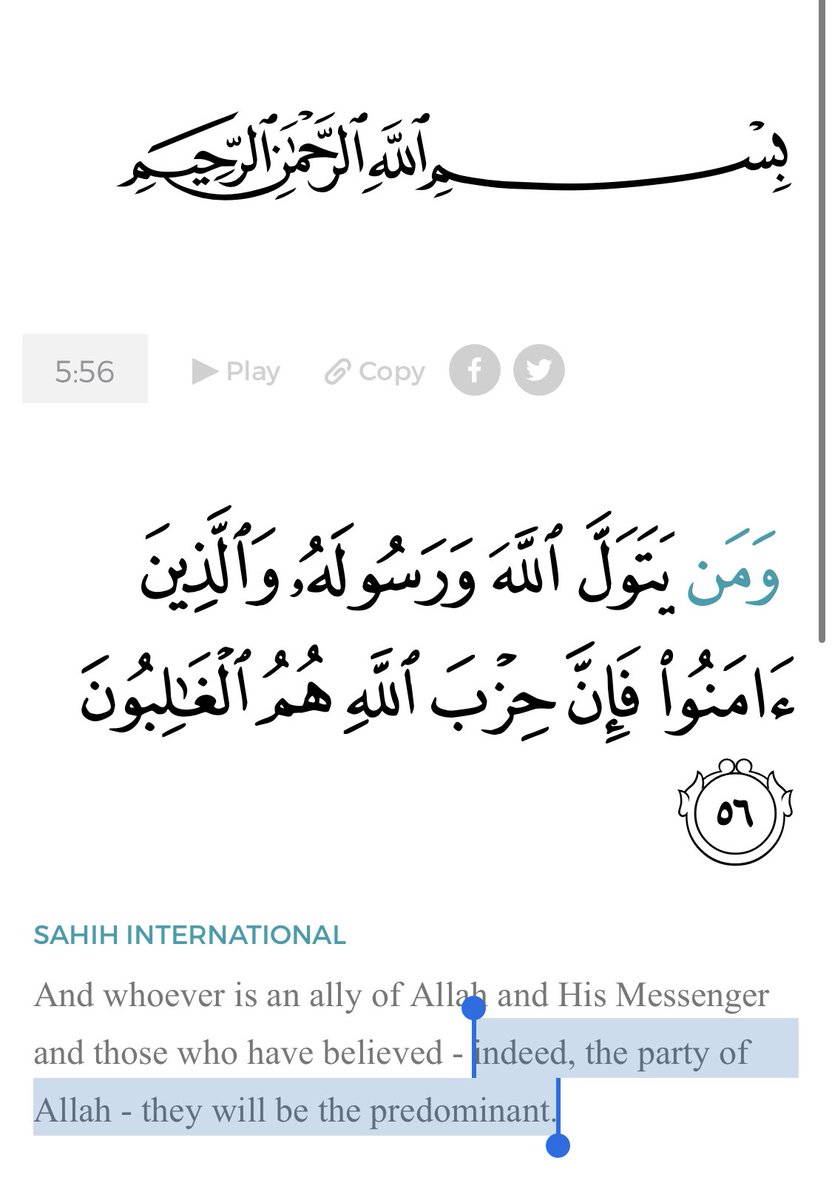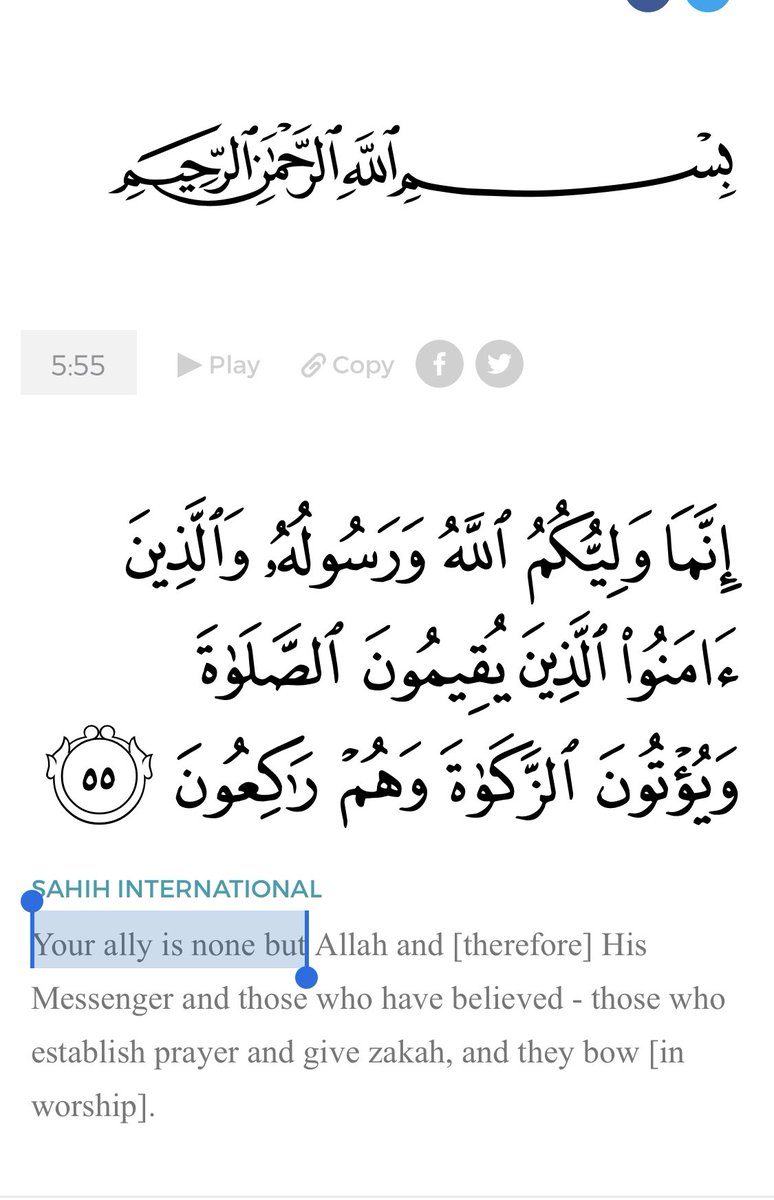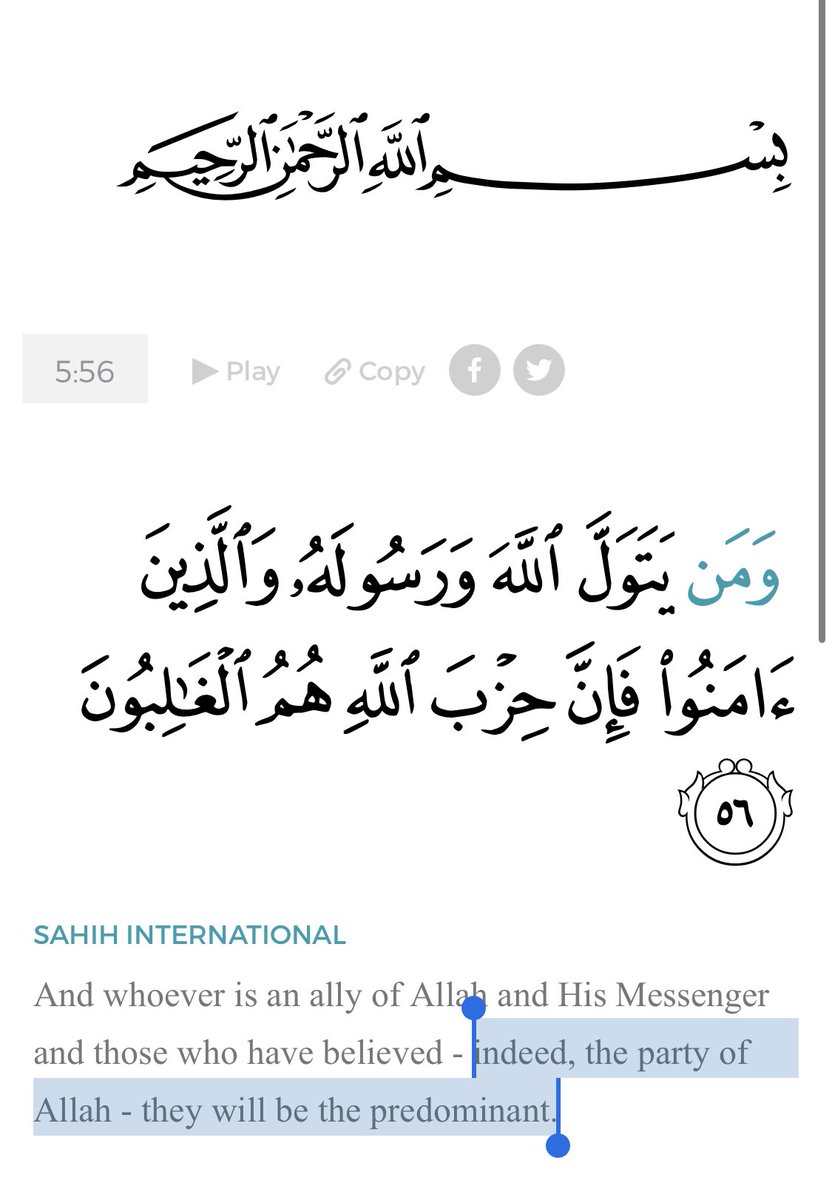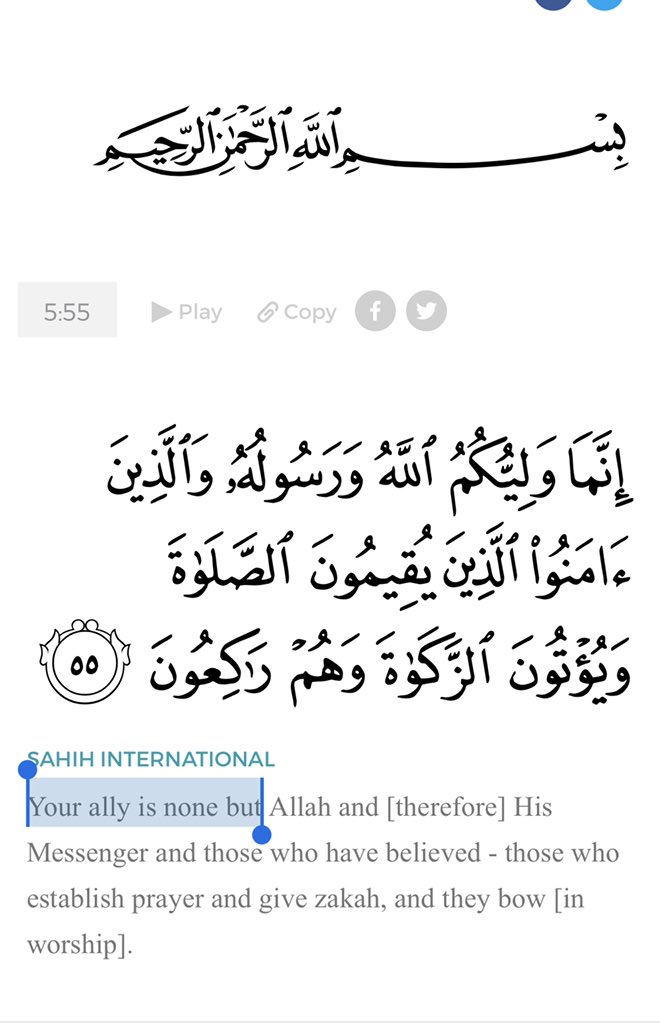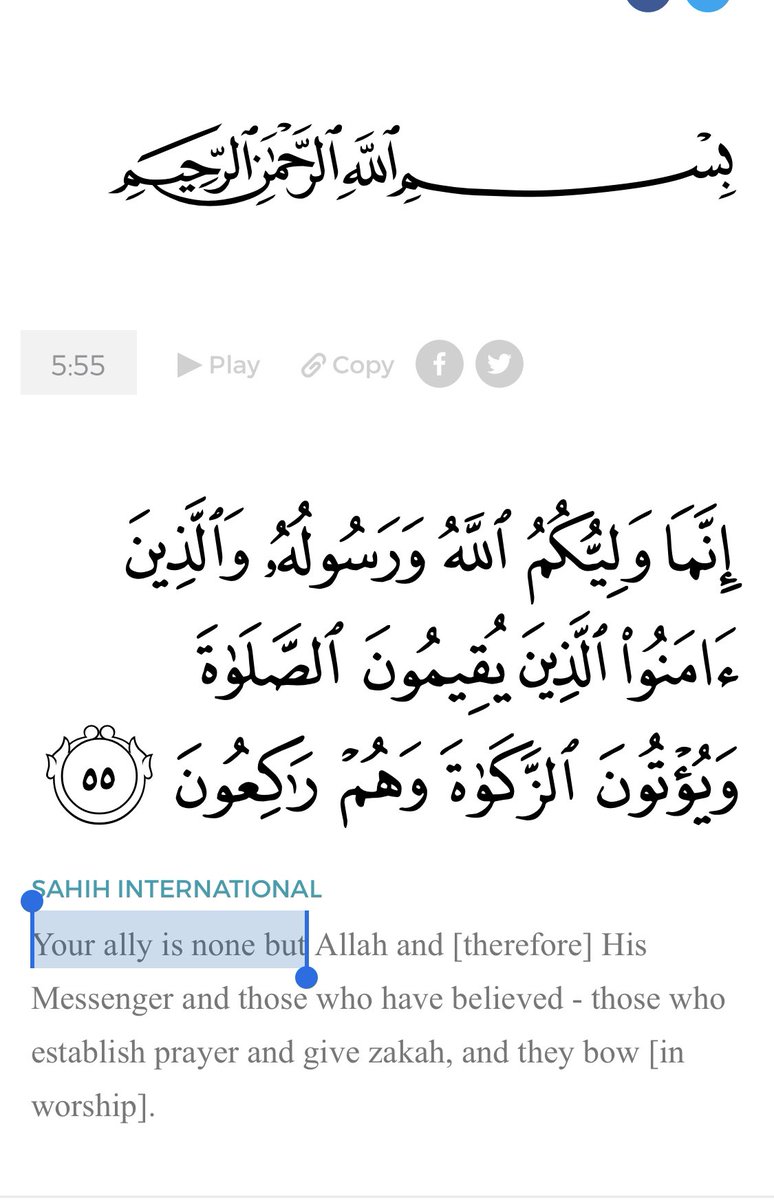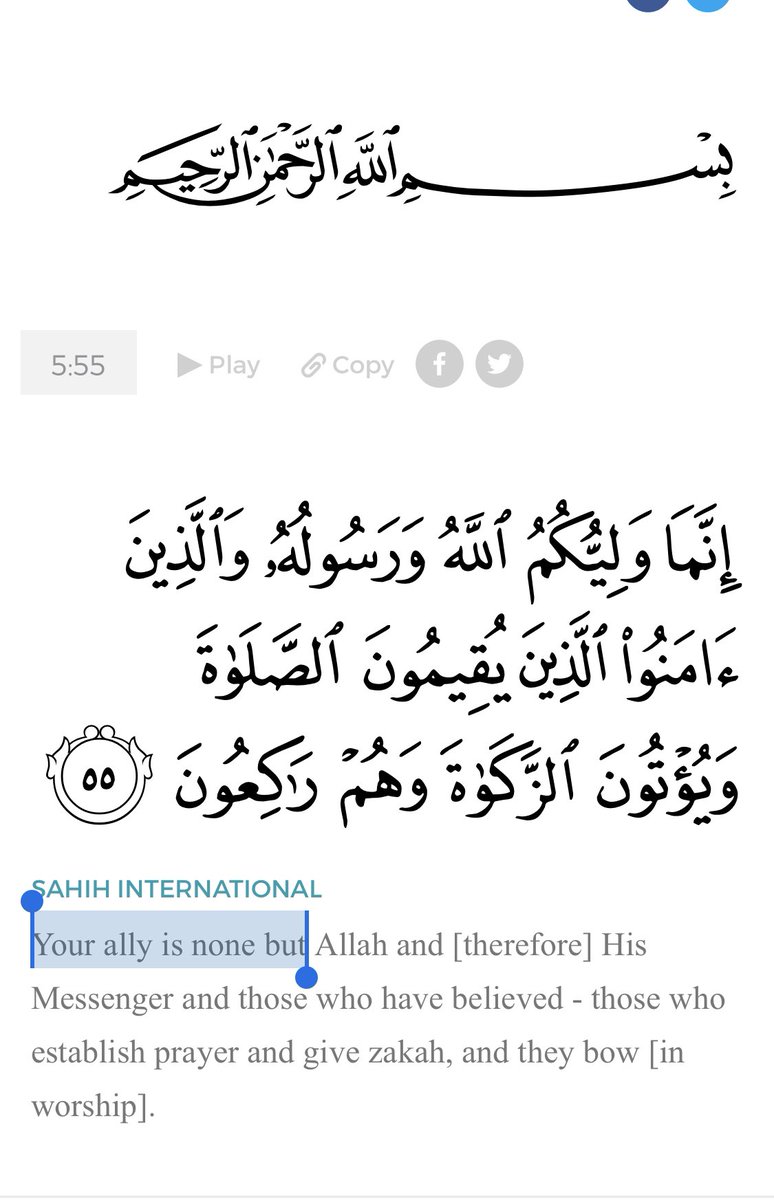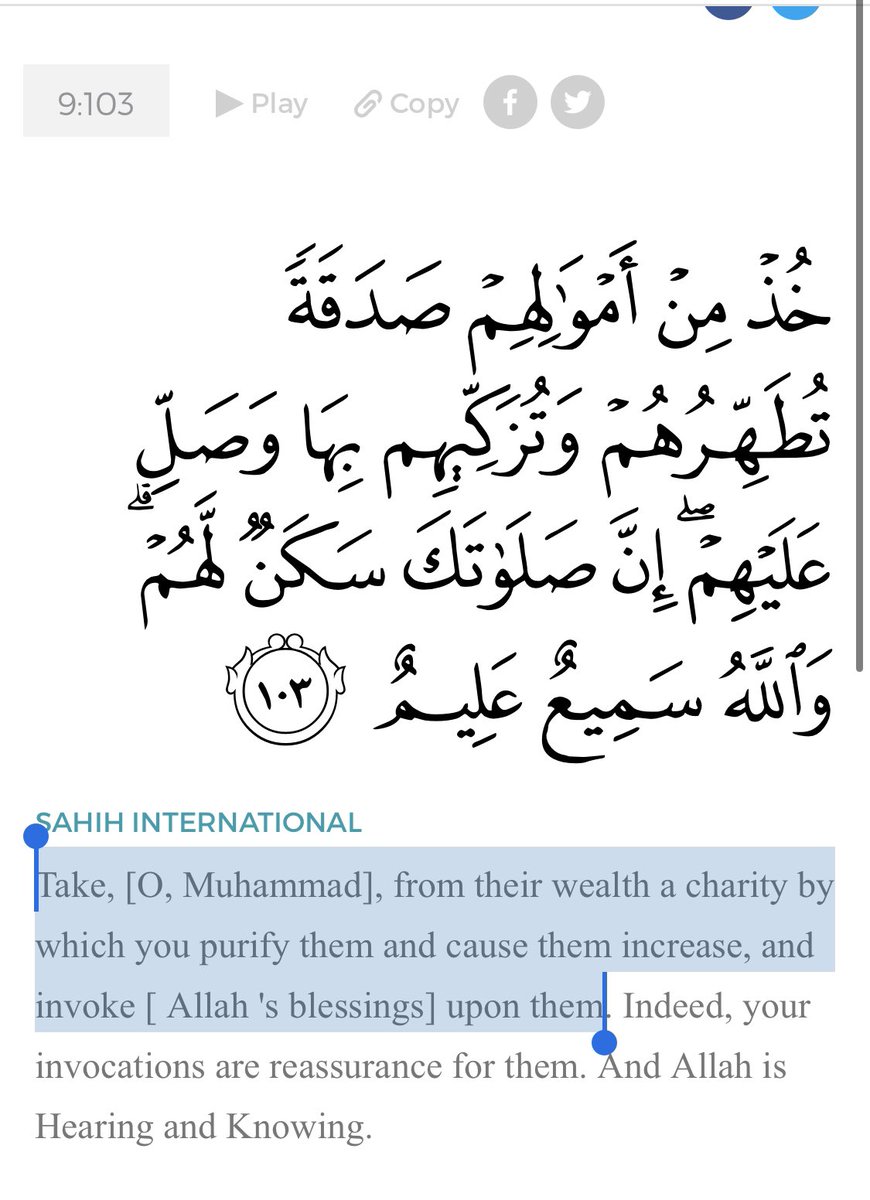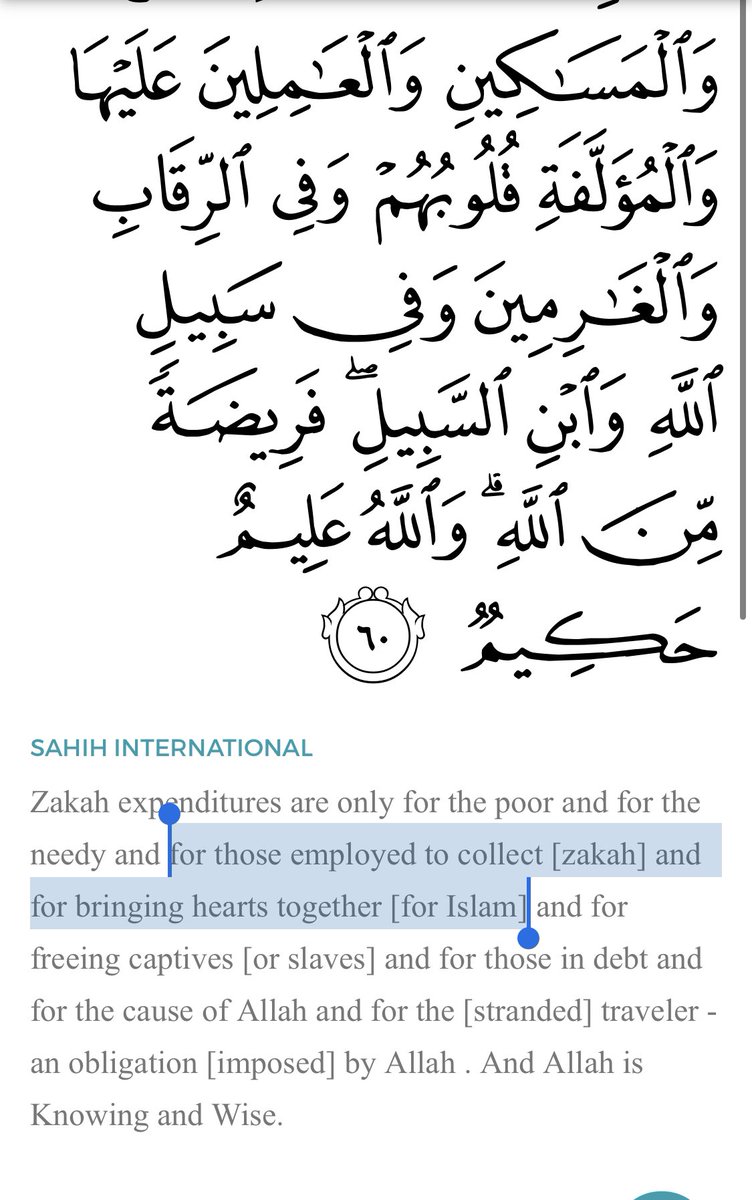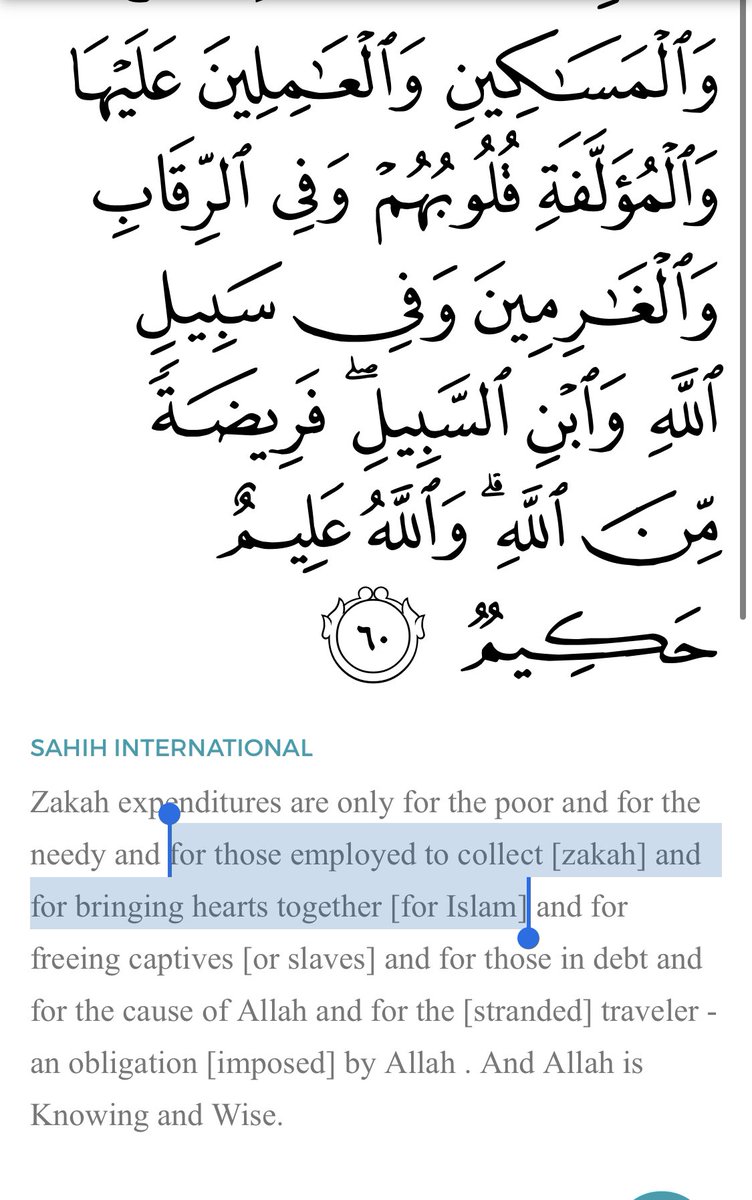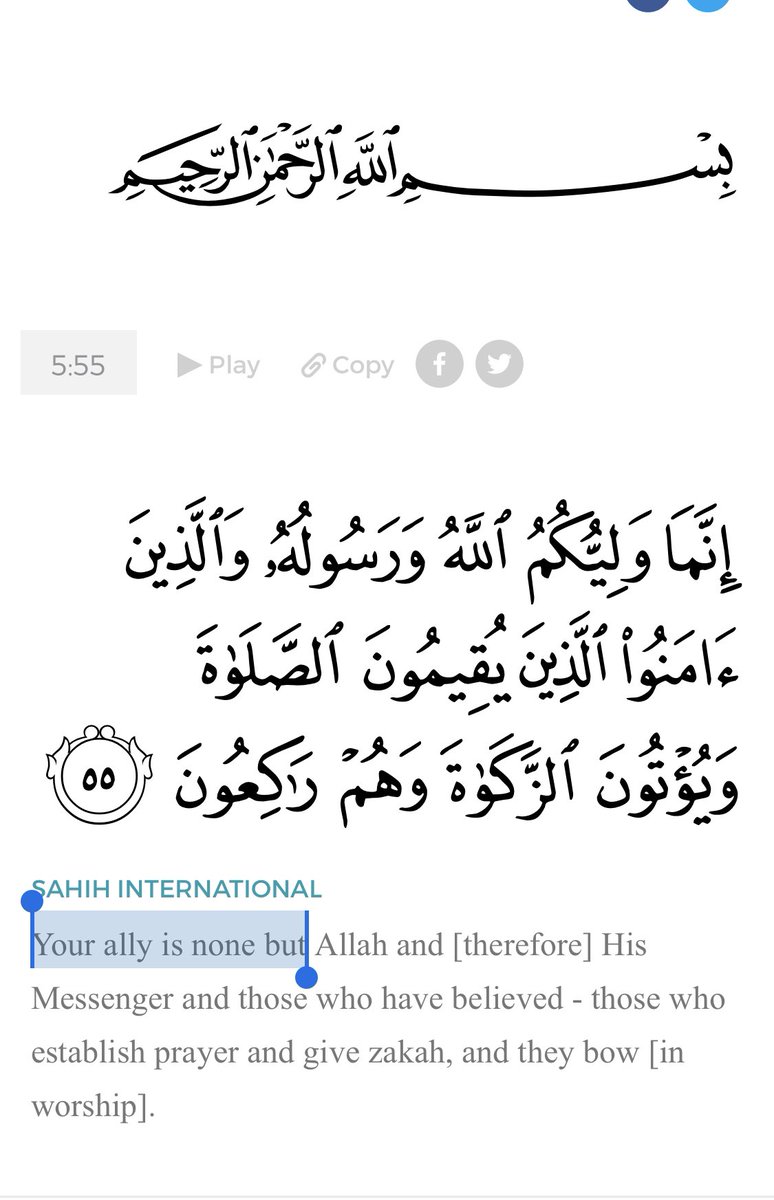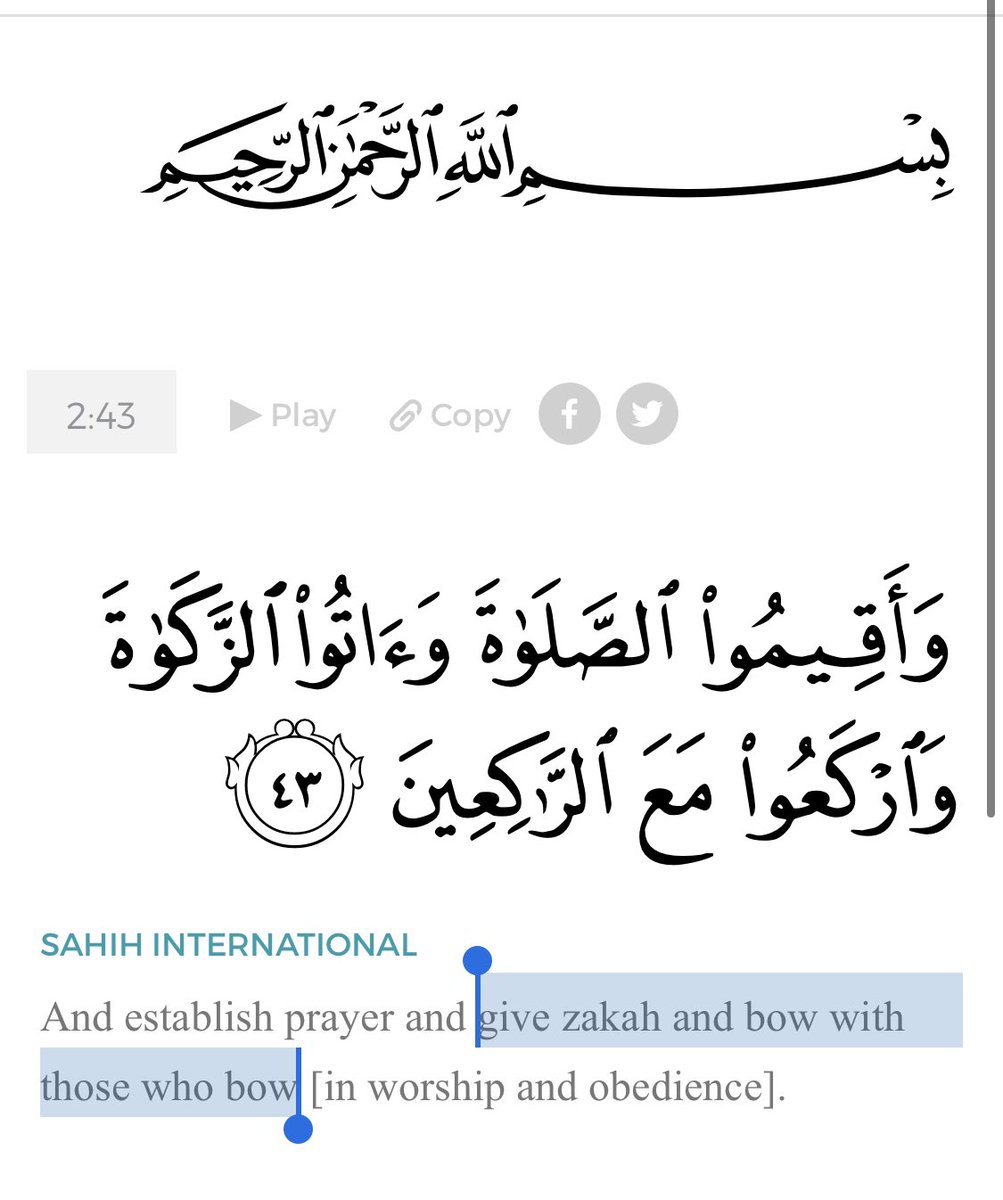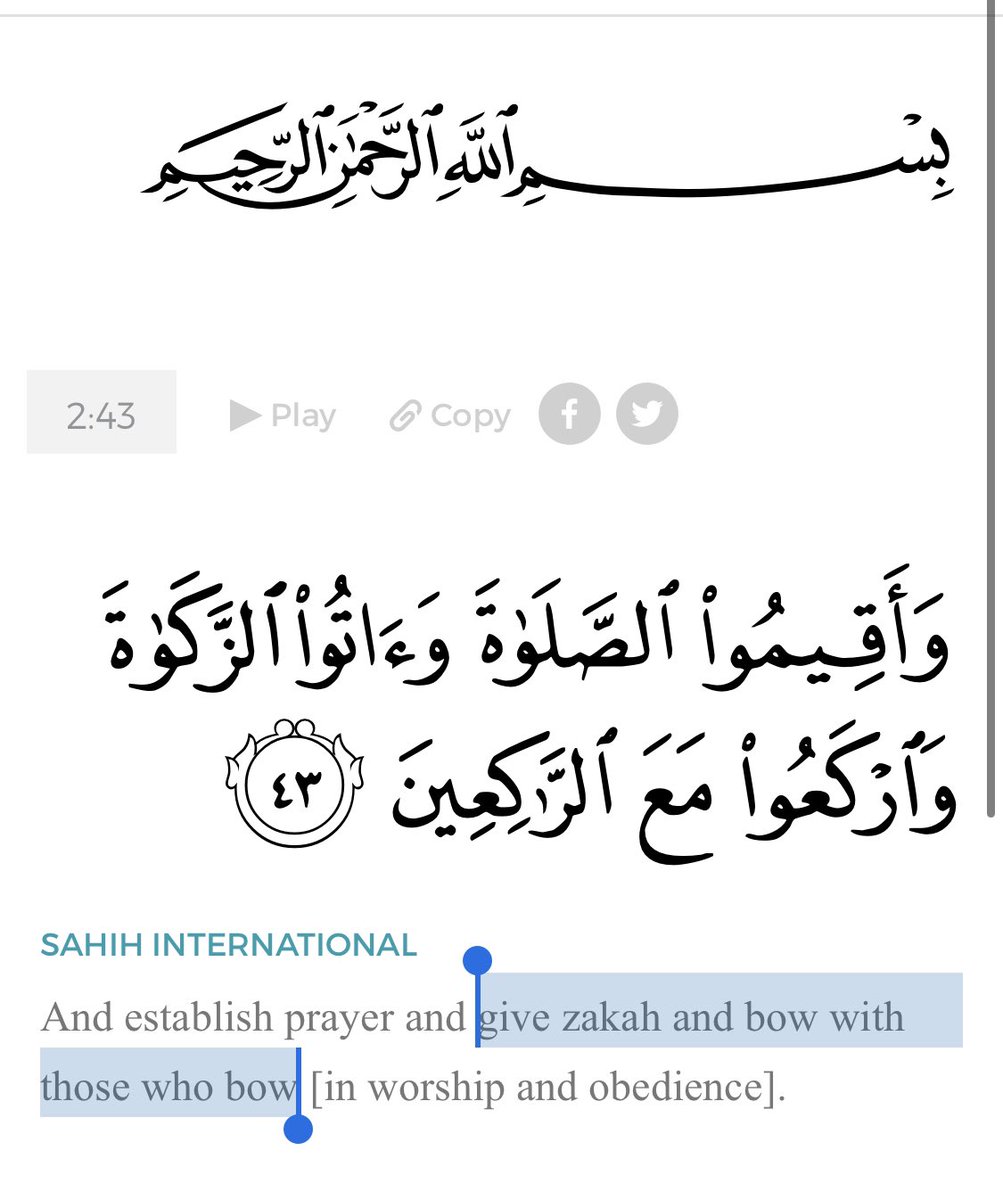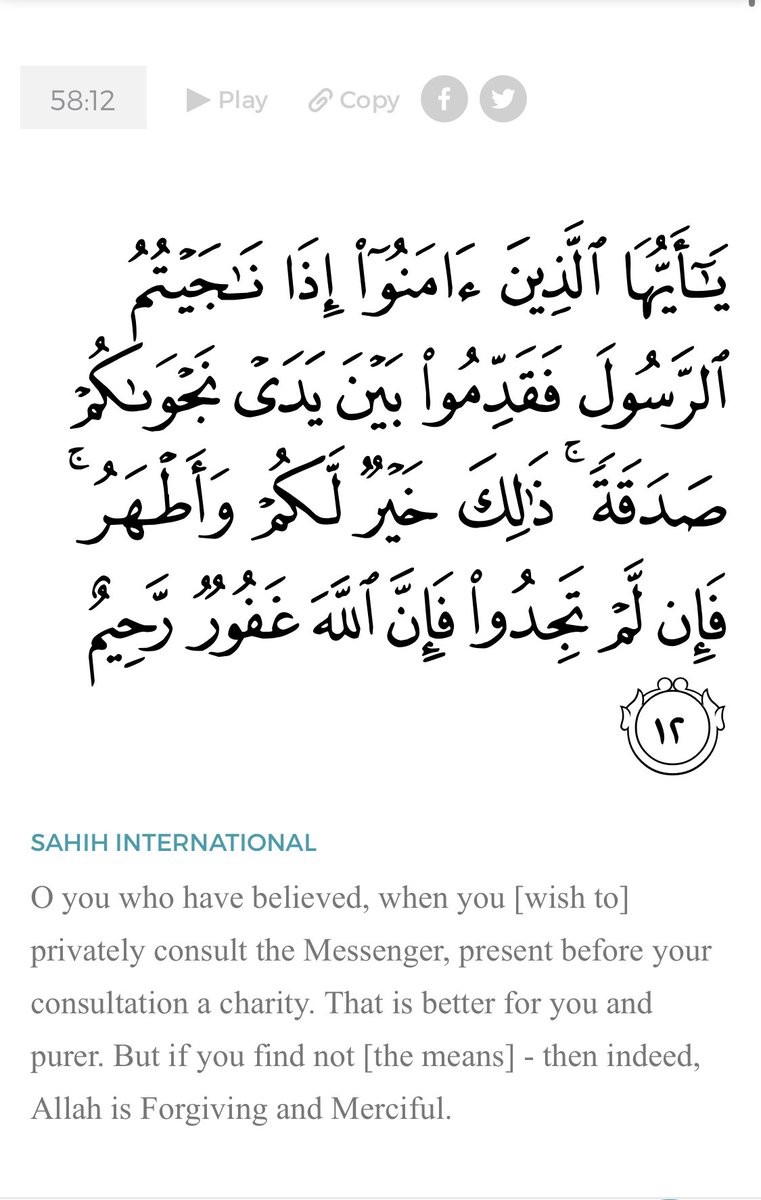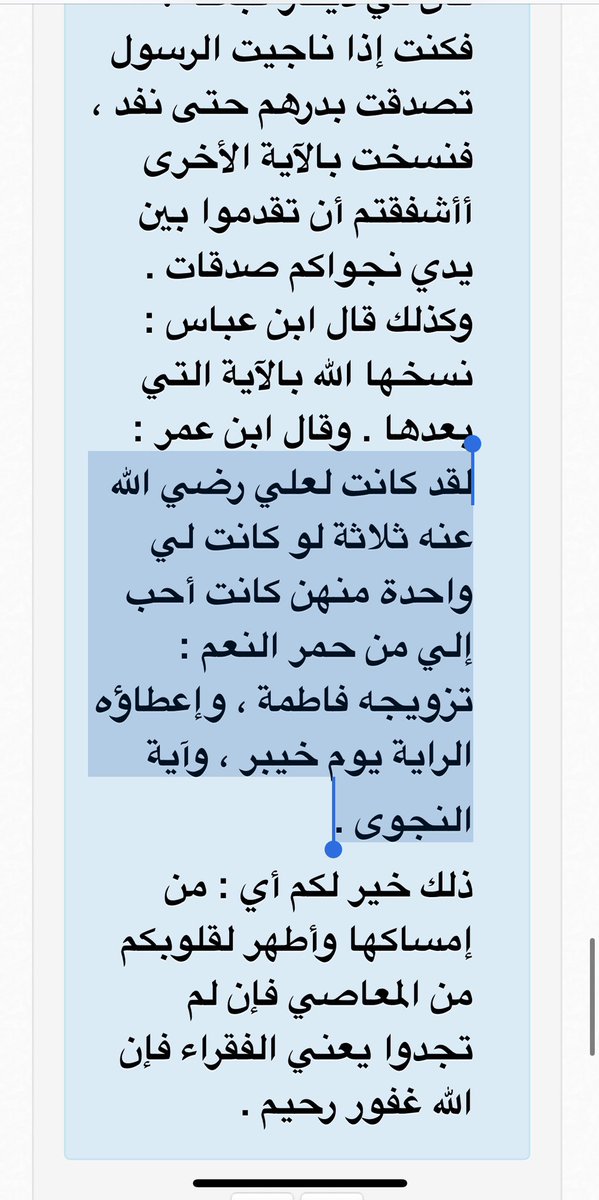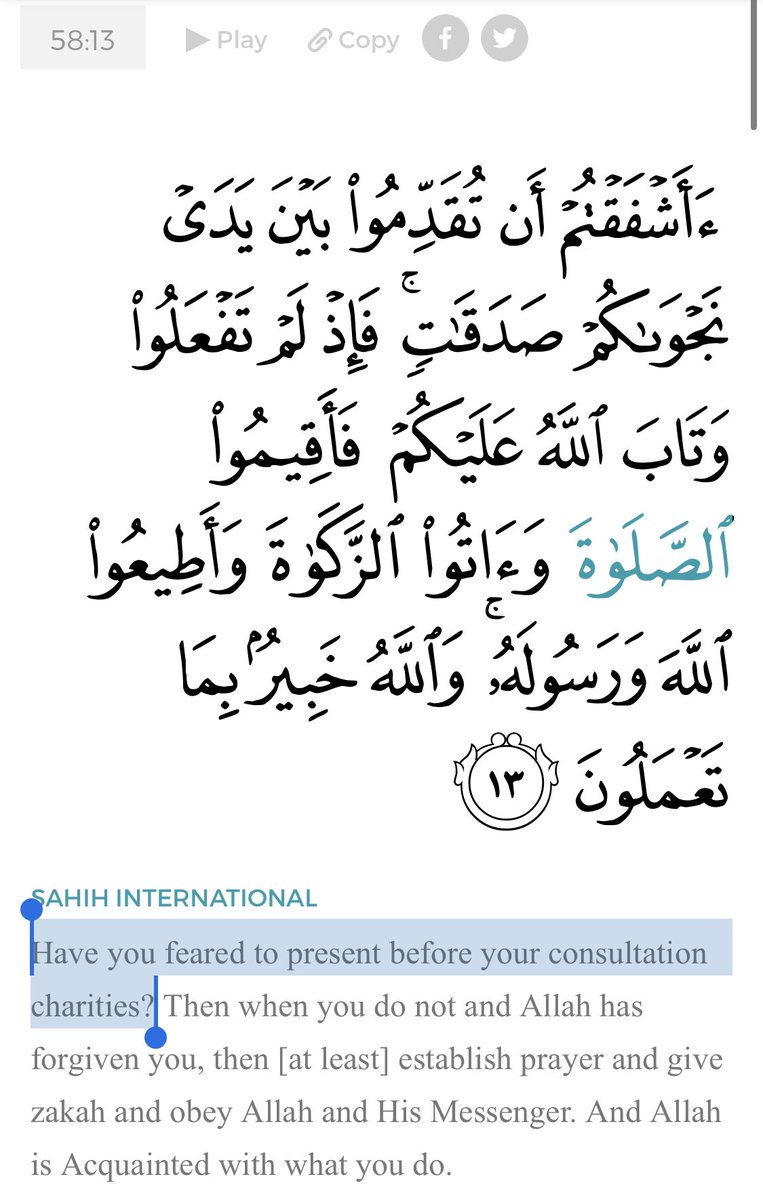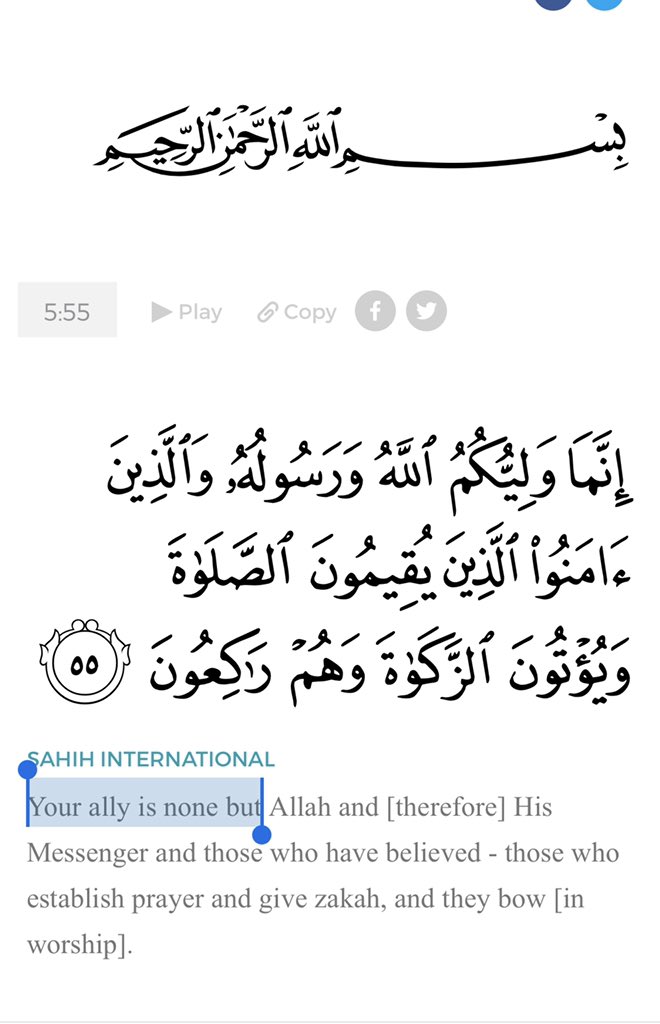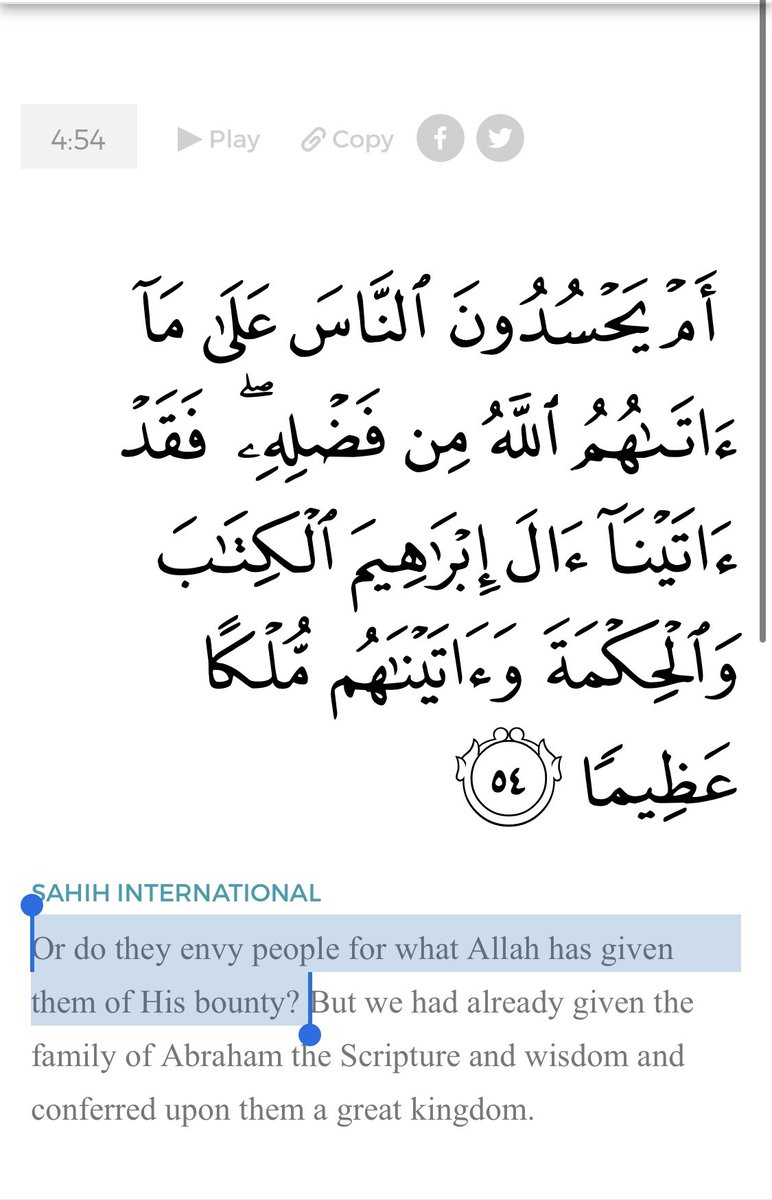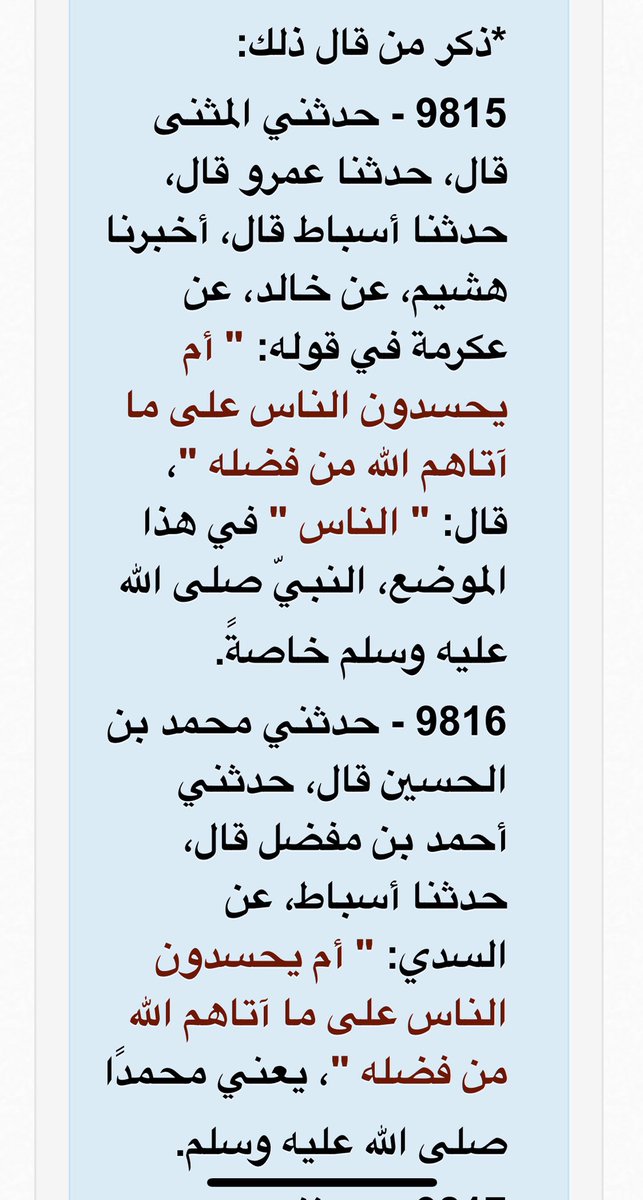In this thread inshallah, I will be discussing verse 5:55 from a dhahir perspective.
[Thread]
[Thread]
1) Let us begin by taking a look at the first word in the verse, ‘انما’ (Inama).
‘انما’ suggests that God is addressing an incorrect conception that people are having, and he offers a solution to it.
That’s why ‘انما’ is translated here as ‘None but’.
‘انما’ suggests that God is addressing an incorrect conception that people are having, and he offers a solution to it.
That’s why ‘انما’ is translated here as ‘None but’.
2) As in, ‘your ally is none but Allah, the Messenger, and those who have believed..’
What incorrect conception would God want to correct by mentioning that the only true ally is Allah, the Messenger, and believers?
What incorrect conception would God want to correct by mentioning that the only true ally is Allah, the Messenger, and believers?
3) The Sahaba concealed their affection towards the disbelievers, seeking to ally with them even though Allah commanded them not to.
https://twitter.com/andaluso24/status/1276386228770930689?s=21">https://twitter.com/andaluso2... https://twitter.com/Andaluso24/status/1276386228770930689">https://twitter.com/Andaluso2...
https://twitter.com/andaluso24/status/1276386228770930689?s=21">https://twitter.com/andaluso2... https://twitter.com/Andaluso24/status/1276386228770930689">https://twitter.com/Andaluso2...
4) They extended affection towards and allied with the kuffar in pursuit of honor / glory العزة, seeking power (4:139)
Allah criticizes them for this and commands them not take the kuffar as allies (4:144), lest they want to give Allah a clear case against themselves.
Allah criticizes them for this and commands them not take the kuffar as allies (4:144), lest they want to give Allah a clear case against themselves.
5) In fact, in 58:22, Allah compares the Sahaba taking the kuffar as allies to actual kufr.
https://twitter.com/andaluso24/status/1276386870088343553?s=21">https://twitter.com/andaluso2... https://twitter.com/Andaluso24/status/1276386870088343553">https://twitter.com/Andaluso2...
https://twitter.com/andaluso24/status/1276386870088343553?s=21">https://twitter.com/andaluso2... https://twitter.com/Andaluso24/status/1276386870088343553">https://twitter.com/Andaluso2...
6) And in Surat al-Ma’ida (5:81), the Sahaba - as evident by Allah saying if they were truly Muslim, believing in Allah and what was revealed to the Prophet - they would not take the kuffar as allies.
And Allah concedes that many of these Sahaba are fasiq فاسقون
And Allah concedes that many of these Sahaba are fasiq فاسقون
7) And as we know, a fasiq is not a believer. Believer is a term in the Quran referring to Muslims in general, it doesn’t address Muslims as ‘Oh you who submit’. It addresses them as ‘Oh you who believer’.
Someone who is not a believer, is a kafir. Not a Muslim.
Someone who is not a believer, is a kafir. Not a Muslim.
8) “Then is one who was a believer like one who was defiantly disobedient? They are not equal.”
The Sahaba who took the kuffar as allies - are kuffar themselves.
Even if they continued to be part of the Islamic State.
The Sahaba who took the kuffar as allies - are kuffar themselves.
Even if they continued to be part of the Islamic State.
9) Anyway, back to our main point.
58:22 describes the lack of belief / of the Sahaba who take the kuffar as allies.
And it says that ones who truly believe (meaning, ones don’t take the kuffar as allies), they are ‘unquestionably, [the] Party of Allah - they are successful”
58:22 describes the lack of belief / of the Sahaba who take the kuffar as allies.
And it says that ones who truly believe (meaning, ones don’t take the kuffar as allies), they are ‘unquestionably, [the] Party of Allah - they are successful”
10) Not taking the ‘kuffar’ as allies meaning they take the ‘believers’ as allies.
As , “the believing men and believing women are allies of one another, they enjoin what is right.. establish prayer and give zakah” (9:71)
As , “the believing men and believing women are allies of one another, they enjoin what is right.. establish prayer and give zakah” (9:71)
11) So, essentially.
5:55 is saying that O Sahaba, the kuffar are not your allies. Only the Allah, Messenger, & believers are your allies.
And 5:56 shows that if you ally with them, you will become part of the “Party of Allah”.
5:55 is saying that O Sahaba, the kuffar are not your allies. Only the Allah, Messenger, & believers are your allies.
And 5:56 shows that if you ally with them, you will become part of the “Party of Allah”.
12) As I clarified here, 58:22 shows that the ‘Party of Allah’ refers to the Sahaba who ally only with believers. This kind of Sahaba are true believers.
If the Sahaba are not from the Party of Allah, they are disbelievers as they have allied with the kuffar. https://twitter.com/Andaluso24/status/1281232016051253249">https://twitter.com/Andaluso2...
If the Sahaba are not from the Party of Allah, they are disbelievers as they have allied with the kuffar. https://twitter.com/Andaluso24/status/1281232016051253249">https://twitter.com/Andaluso2...
13) Thus, 5:55-5:56 are saying that if you want to become a true believer recognized by God.
You must ally with Allah, the Messenger, and the believers who establish pray & pay zakah.
You must ally with Allah, the Messenger, and the believers who establish pray & pay zakah.
14) Now these allying with these three 3 things are essential for imaan (true belief). Such as without it, we are considered kuffar.
We know what Allah & the Messenger are referring to.
But from a dhahir perspective - can ‘the believers who establish prayer & pay zakah’ refer
We know what Allah & the Messenger are referring to.
But from a dhahir perspective - can ‘the believers who establish prayer & pay zakah’ refer
15) Refer to exclusively Imam Ali as a hukm (commandment) from Allah?
It is possible - for sure.
But we have to get some things across before analyzing from that angle.
It is possible - for sure.
But we have to get some things across before analyzing from that angle.
16) Firstly, the story behind Imam Ali doing giving charity to the poor beggar while bowing.
That charity cannot be considered ‘zakat’.
That charity cannot be considered ‘zakat’.
17) Zakat is different from normal sadaqa.
Sadaqa is money you can directly pay towards charitable reasons, such as paying the poor
Zakat is mandatory taxation, you can only pay to the Prophet
Sadaqa is money you can directly pay towards charitable reasons, such as paying the poor
Zakat is mandatory taxation, you can only pay to the Prophet
18) The Prophet takes from the Muslims a mandatory sadaqa which purifies them تطهرهم وتزكيهم.
‘Sadaqa’ is essentially money you pay, which proves you have genuine belief. It’s related to the word تصديق.
The mandatory sadaqa, which can only be given to the Prophet, is known as
‘Sadaqa’ is essentially money you pay, which proves you have genuine belief. It’s related to the word تصديق.
The mandatory sadaqa, which can only be given to the Prophet, is known as
19) Is known as ‘Zakat’ because it تزكيهم (tuzakeehim), purifies them.
As Allah instructs the Prophet to send his blessings وصل عليهم if they make such a payment to him.
As Allah instructs the Prophet to send his blessings وصل عليهم if they make such a payment to him.
20) As 9:60 shows, Zakah expenditures can only be directed towards 8 kinds of people.
It is an “obligation” (fareeda) from Allah, as opposed to normal Sadaqa which is optional.
It is only managed by the Prophet, as evident by a share of Zakat reserved for
It is an “obligation” (fareeda) from Allah, as opposed to normal Sadaqa which is optional.
It is only managed by the Prophet, as evident by a share of Zakat reserved for
21) Reserved for “those employed to collect zakah”. As in, governors or tax farmers appointed by the Prophet to collect Zakat taxes. They get a cut of Zakat.
And the ‘Mulafati Qulubuhum’ which is reserved for recent ‘converts’ whose loyalty to the Islamic State is doubtable &
And the ‘Mulafati Qulubuhum’ which is reserved for recent ‘converts’ whose loyalty to the Islamic State is doubtable &
& kafir tribal chiefs whose loyalty to the Islamic State can be purchased. Even if their genuine belief is not guaranteed.
22) Thus, Imam Ali cannot pay Zakat to a beggar.
Imam Ali can only pay Zakat to the Prophet.
And the Prophet can distribute it to the poor, including beggars, as part of the 8 shares of Zakat expenditures.
Imam Ali can only pay Zakat to the Prophet.
And the Prophet can distribute it to the poor, including beggars, as part of the 8 shares of Zakat expenditures.
22) What Imam Ali did was pay Sadaqa to the beggar, while bowing.
Which brings us to another portion of the verse I’d like to focus on.
يؤتون الزكاة وهم راكعون
They pay zakat WHILE bowing
What is this referring to?
Which brings us to another portion of the verse I’d like to focus on.
يؤتون الزكاة وهم راكعون
They pay zakat WHILE bowing
What is this referring to?
23) Firstly, the translation deceptively translates the وهم راكعون part as “and they are bowing”. To make the bowing seem as an act of prayer, as though it is separate from paying Zakat.
IF it were relate to prayer, God would mention it alongside when he said ‘those who
IF it were relate to prayer, God would mention it alongside when he said ‘those who
25) And here is an example of a Quranic verse in which ‘وهم’ means ‘while they are’.
Not ‘and they are’.
https://twitter.com/andaluso24/status/1186858958893539328?s=21">https://twitter.com/andaluso2... https://twitter.com/Andaluso24/status/1186858958893539328">https://twitter.com/Andaluso2...
Not ‘and they are’.
https://twitter.com/andaluso24/status/1186858958893539328?s=21">https://twitter.com/andaluso2... https://twitter.com/Andaluso24/status/1186858958893539328">https://twitter.com/Andaluso2...
26) So if Zakat is paid only to the Prophet.
And we are to pray Zakat while bowing.
Are we to pay Zakat to the Prophet as a symbol of submission to him, and thus submission to Allah?
Yes!
I explain why here https://twitter.com/andaluso24/status/1186862270376267776?s=21">https://twitter.com/andaluso2... https://twitter.com/Andaluso24/status/1186862270376267776">https://twitter.com/Andaluso2...
And we are to pray Zakat while bowing.
Are we to pay Zakat to the Prophet as a symbol of submission to him, and thus submission to Allah?
Yes!
I explain why here https://twitter.com/andaluso24/status/1186862270376267776?s=21">https://twitter.com/andaluso2... https://twitter.com/Andaluso24/status/1186862270376267776">https://twitter.com/Andaluso2...
27) Paying Zakat to the Prophet while bowing is not simply a commandment towards Imam Ali, if 5:55 is exclusive to him.
But to Muslims in general.
But to Muslims in general.
28) And ‘bow with those who bow’ doesn’t mean Muslims simultaneously give Zakat to the prophet and bow at the same time.
Rather, the meaning is to signify that those who pay Zakat are part of other Muslims. They are true believers, like their Muslim brother.
Rather, the meaning is to signify that those who pay Zakat are part of other Muslims. They are true believers, like their Muslim brother.
29) Similarly, when bowing IS referring to prayer. And not zakat.
God tells Mary to ‘bow with those who bow’.
It is NOT meant literally, as Mary is a woman and not expected to bow publicly with believing men.
But rather, ‘bow with those who bow’ is symbolic of her being
God tells Mary to ‘bow with those who bow’.
It is NOT meant literally, as Mary is a woman and not expected to bow publicly with believing men.
But rather, ‘bow with those who bow’ is symbolic of her being
30) Being part of the believer community.
31) Now, with all that said, how can 5:55 still refer to wilayah of Imam Ali exclusively?
Before we get to this. We have to talk about how the context of the verse (Imam Ali giving normal sadaqa to the beggar while praying) can lead to revelation of a verse which specifies
Before we get to this. We have to talk about how the context of the verse (Imam Ali giving normal sadaqa to the beggar while praying) can lead to revelation of a verse which specifies
32) Which specifies zakat.
Well. Both normal Sadaqa & zakat are ultimately a form of ‘sadaqa’, a form of payment highlighting their تصديق (belief) in Allah’s commandments.
If Ali rushes to pay his Sadaqa while bowing, even as he prays. Then why can’t you normal Sahaba
Well. Both normal Sadaqa & zakat are ultimately a form of ‘sadaqa’, a form of payment highlighting their تصديق (belief) in Allah’s commandments.
If Ali rushes to pay his Sadaqa while bowing, even as he prays. Then why can’t you normal Sahaba
Be like Ali and pay your Sadaqa, showing your submission to the Prophet and thus Allah, at least in normal times.
You don’t have to be like Ali, but at least strive to be like him.
We see an example of this in 58:12&14
You don’t have to be like Ali, but at least strive to be like him.
We see an example of this in 58:12&14
33) 58:12 instructs the Sahaba that when they seek to consult the Prophet, they should pay Sadaqa.
Ibn Umar (as evident in Tafsir al-Qurtubi) mentions that the only person to have paid Sadaqa while seeking a consultation from tbe prophet
Ibn Umar (as evident in Tafsir al-Qurtubi) mentions that the only person to have paid Sadaqa while seeking a consultation from tbe prophet
34) The rest of the Sahaba did not want to do pay Sadaqa to the Prophet, as they went to gain consultation from the Prophet.
So Allah abrogated this commandment (paying sadaqa to gain consultation from Prophet)
So Allah abrogated this commandment (paying sadaqa to gain consultation from Prophet)
35) This is why Allah compares Ali doing an act of sadaqa while bowing in an unconventional kind of place (while praying).
To mandatory Zakat in 5:55.
It’s telling the Sahaba - try your best to be like Ali, even if you can’t possibly be like him
To mandatory Zakat in 5:55.
It’s telling the Sahaba - try your best to be like Ali, even if you can’t possibly be like him
36) Now with context explained within the dhahir framework of the verse.
Can 5:55 be a hukm that true belief lies only by allying with Ali? Despite it referring to believers in plural?
The answer is yes!
Can 5:55 be a hukm that true belief lies only by allying with Ali? Despite it referring to believers in plural?
The answer is yes!
37) Plurality can refer to a single person.
The interpretations of al-Suddi, Ikrima, and others mentioned in Tabari’s interpretation of 4:54 see ‘the people’ that are envied in that mentioned in that verse refers to Muhammad exclusively.
The interpretations of al-Suddi, Ikrima, and others mentioned in Tabari’s interpretation of 4:54 see ‘the people’ that are envied in that mentioned in that verse refers to Muhammad exclusively.
38) Tabari explains here how plural can actually refer to one person only, exclusively.
And uses linguistic analogies to explain why.
https://twitter.com/andaluso24/status/1250683903939051520?s=21">https://twitter.com/andaluso2... https://twitter.com/Andaluso24/status/1250683903939051520">https://twitter.com/Andaluso2...
And uses linguistic analogies to explain why.
https://twitter.com/andaluso24/status/1250683903939051520?s=21">https://twitter.com/andaluso2... https://twitter.com/Andaluso24/status/1250683903939051520">https://twitter.com/Andaluso2...
39) Here is my thread on the topic of plurality in the Quran referring to one person
https://twitter.com/andaluso24/status/1250682794377969665?s=21">https://twitter.com/andaluso2... https://twitter.com/Andaluso24/status/1250682794377969665">https://twitter.com/Andaluso2...
https://twitter.com/andaluso24/status/1250682794377969665?s=21">https://twitter.com/andaluso2... https://twitter.com/Andaluso24/status/1250682794377969665">https://twitter.com/Andaluso2...
40) And so this is what I think!
Wa Allahu A’lam :)
Wa Allahu A’lam :)
*NOTE: *
Only person to have paid Sadaqa while seeking consultation from the Prophet is Ali
https://twitter.com/andaluso24/status/1281246788452864003?s=21">https://twitter.com/andaluso2... https://twitter.com/Andaluso24/status/1281246788452864003">https://twitter.com/Andaluso2...
Only person to have paid Sadaqa while seeking consultation from the Prophet is Ali
https://twitter.com/andaluso24/status/1281246788452864003?s=21">https://twitter.com/andaluso2... https://twitter.com/Andaluso24/status/1281246788452864003">https://twitter.com/Andaluso2...
NOTE 2:
Pay Zakat while bowing to the Prophet*
https://twitter.com/andaluso24/status/1281242388028104706?s=21">https://twitter.com/andaluso2... https://twitter.com/Andaluso24/status/1281242388028104706">https://twitter.com/Andaluso2...
Pay Zakat while bowing to the Prophet*
https://twitter.com/andaluso24/status/1281242388028104706?s=21">https://twitter.com/andaluso2... https://twitter.com/Andaluso24/status/1281242388028104706">https://twitter.com/Andaluso2...
Further insight on this: https://twitter.com/andaluso24/status/1302044731992612864?s=21">https://twitter.com/andaluso2...

 Read on Twitter
Read on Twitter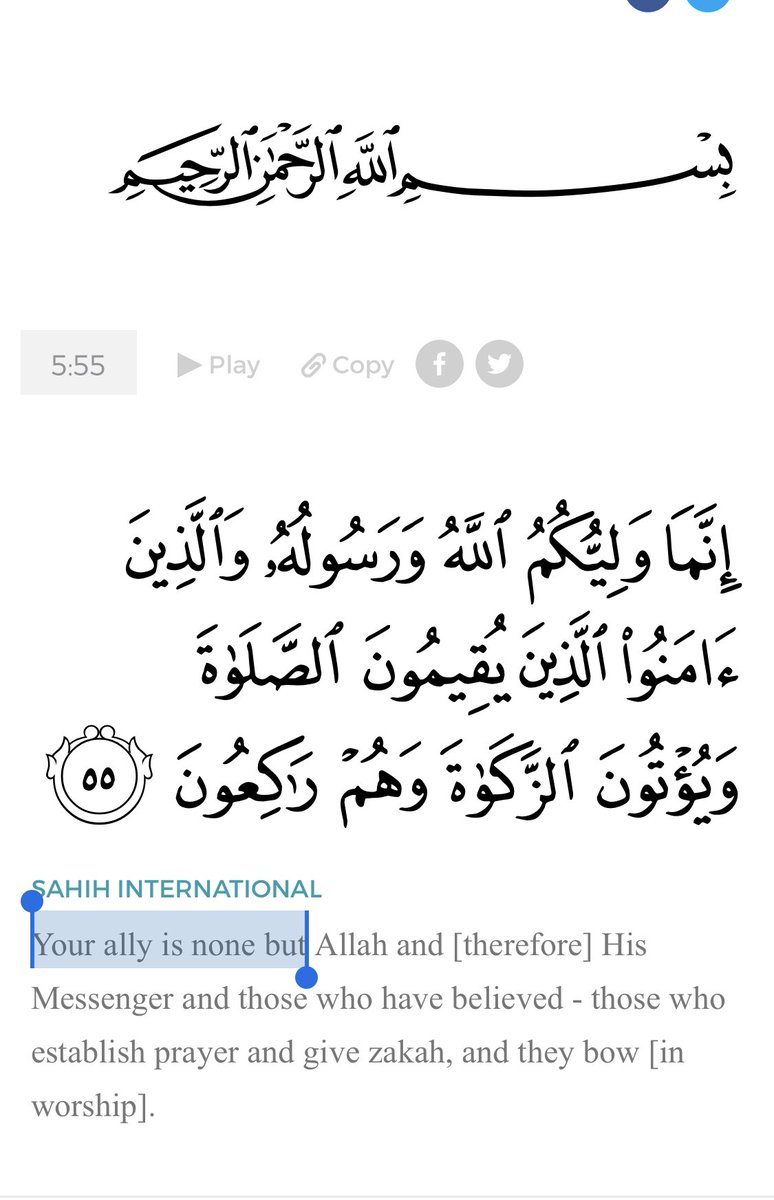

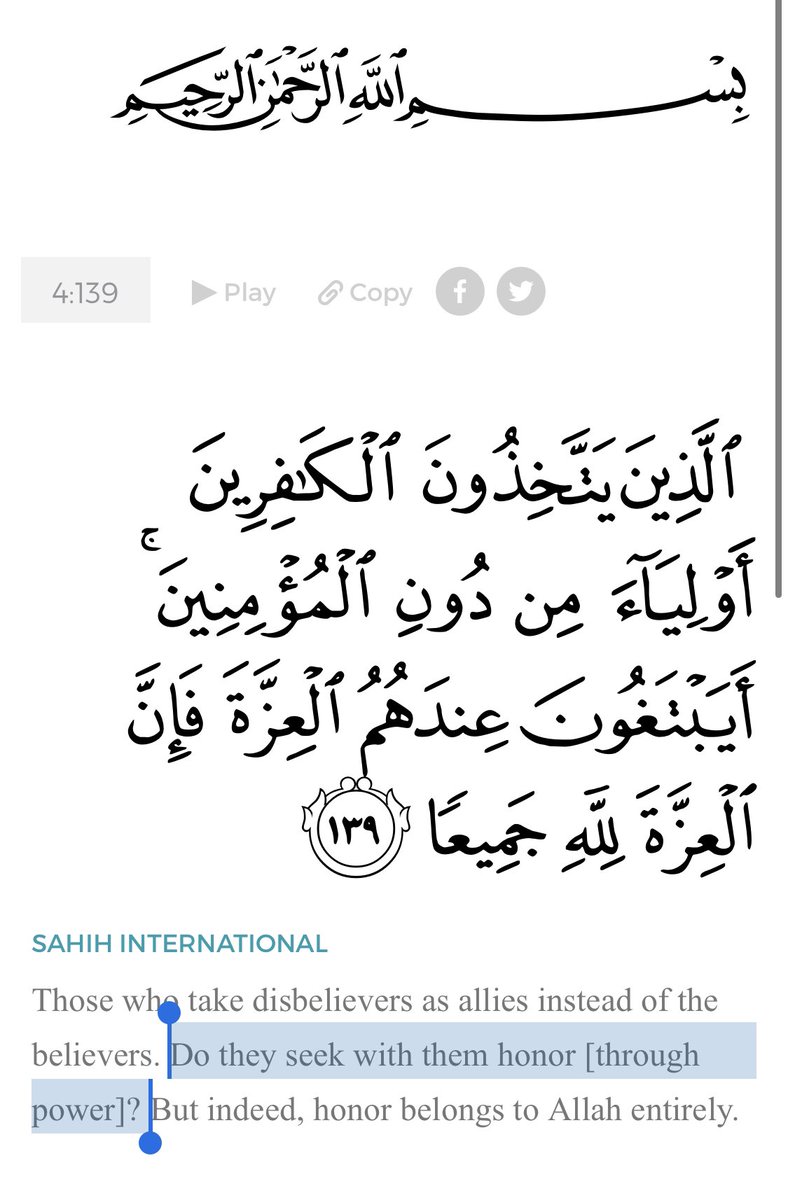


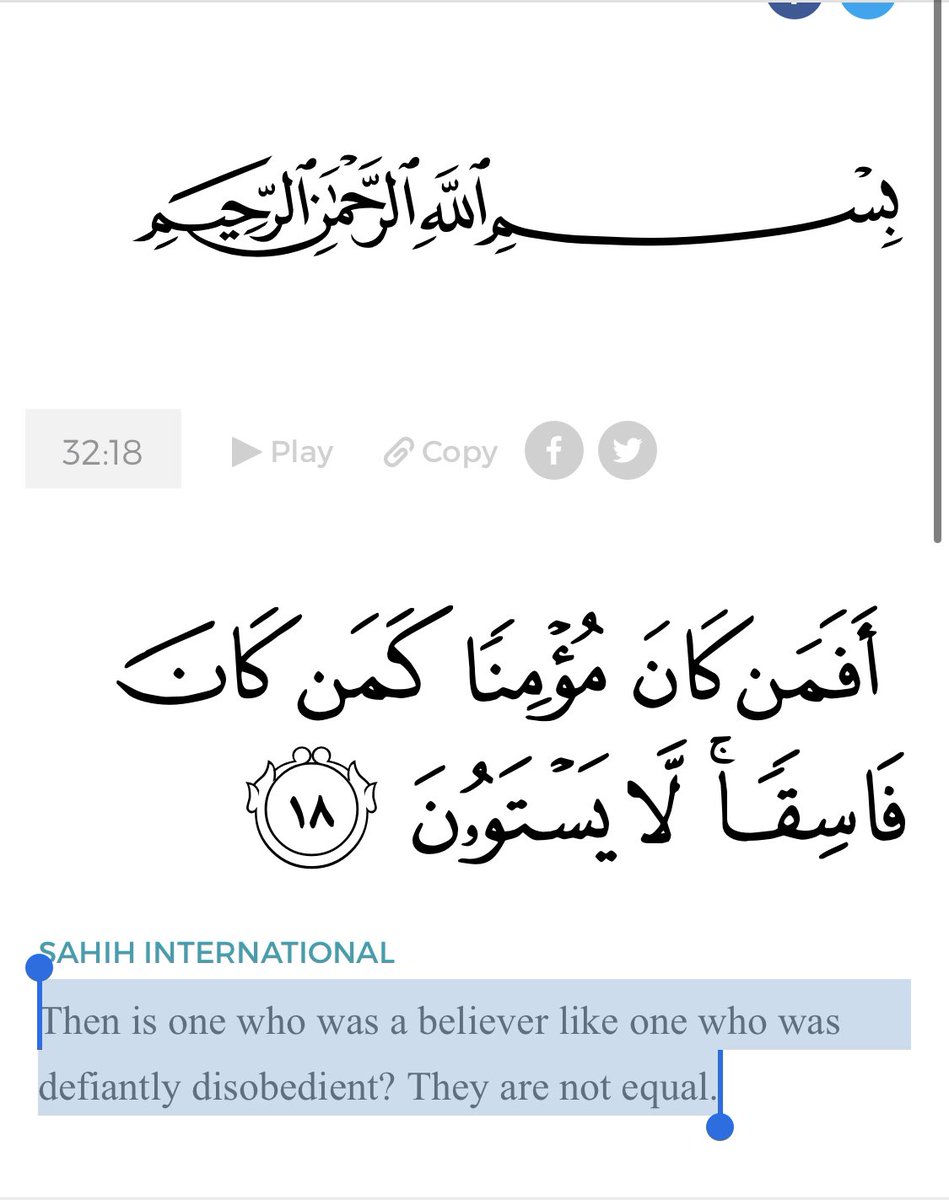
![9) Anyway, back to our main point. 58:22 describes the lack of belief / of the Sahaba who take the kuffar as allies. And it says that ones who truly believe (meaning, ones don’t take the kuffar as allies), they are ‘unquestionably, [the] Party of Allah - they are successful” 9) Anyway, back to our main point. 58:22 describes the lack of belief / of the Sahaba who take the kuffar as allies. And it says that ones who truly believe (meaning, ones don’t take the kuffar as allies), they are ‘unquestionably, [the] Party of Allah - they are successful”](https://pbs.twimg.com/media/EcfZuQQWoAAB-pj.jpg)
